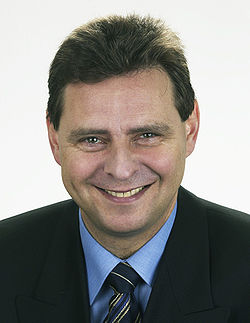You can help expand this article with text translated from the corresponding article in German. (January 2023)Click [show] for important translation instructions.
|
 | |||
| Full name | Bernd Reinhold Gerhard Heynemann | ||
|---|---|---|---|
| Born | 22 January 1954 Magdeburg, East Germany | ||
| Height | 1.96 m (6 ft 5 in) | ||
| Other occupation | Politician | ||
| Domestic | |||
| Years | League | Role | |
| 1980–1991 | DDR-Oberliga | Referee | |
| 1991–2001 | Bundesliga | Referee | |
| International | |||
| Years | League | Role | |
| 1988–1999 | FIFA listed | Referee | |
Bernd Reinhold Gerhard Heynemann (born 22 January 1954 in Magdeburg) [1] is a former German football referee and now a German politician. [2]
